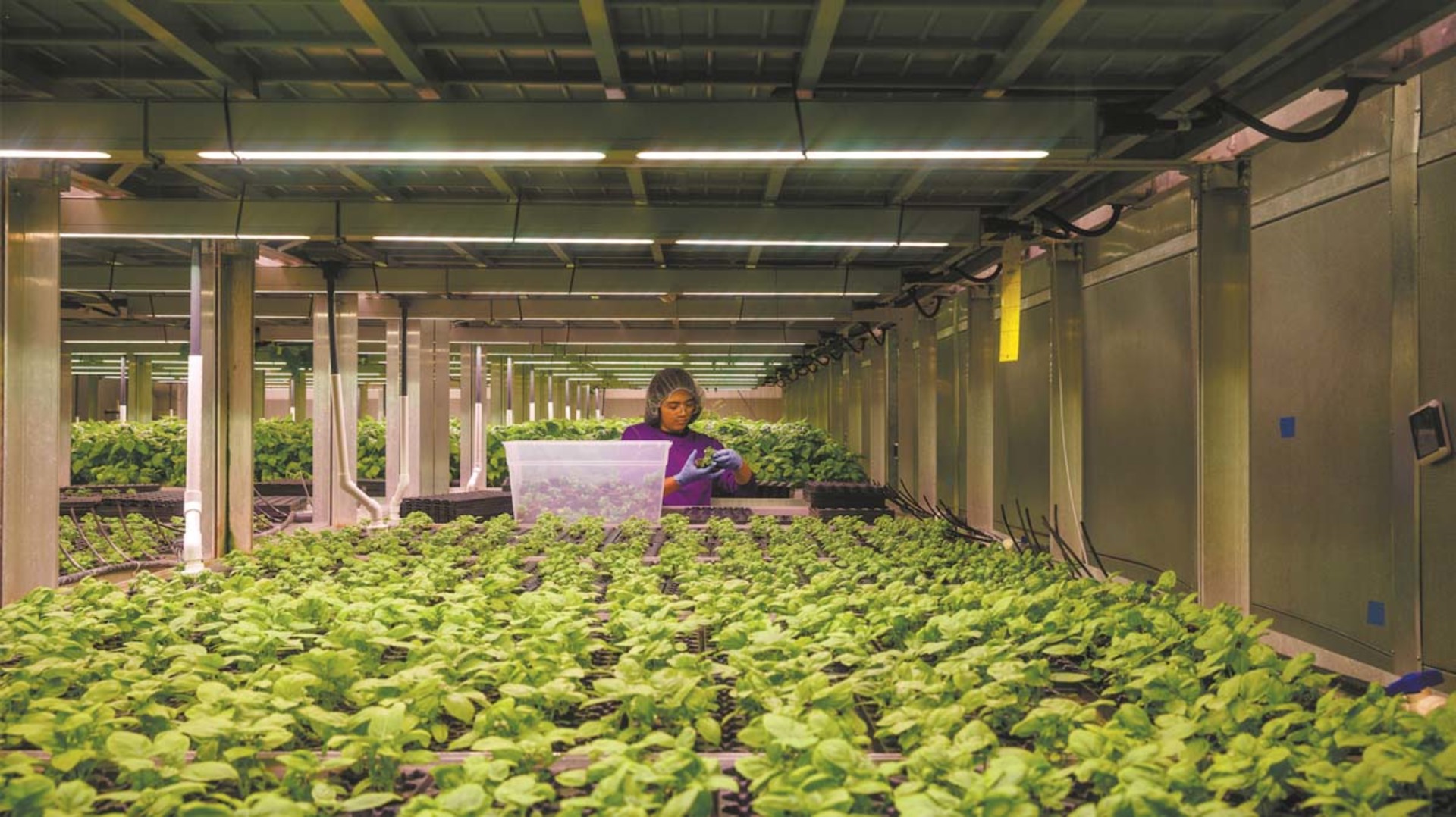80 Acres Farms is in Growth Mode "One Tomato at a Time"
By Barrett J. Brunsman – Staff reporter, Cincinnati Business Courier
Mike Zelkind, CEO of 80 Acres Farms, stepped onto a rectangular mat with raised edges that contained watered-down bleach to sanitize shoes. Then he opened a door and entered a room full of crops growing at an indoor farm in Spring Grove Village.
“We preach food safety,” Zelkind said as he gazed at cherry tomatoes and cucumbers growing on vines. “Feet are the biggest thing I worry about. Most stuff is brought into the facility through your shoes.”
Kale, lettuce and other crops are raised here year-round in nutrient-enriched water and under LED lights that glow pink. No sunlight or soil is required.
“Every part of indoor farming is eighth-grade science,” Zelkind said. “But putting it all together and building a business is something that I don’t believe anybody so far, with the exception of us, has been able to demonstrate.”
That’s why 80 Acres might change the way the world farms – and eats.
“We’ll do it,” Zelkind said. “One tomato at a time.”
The privately held firm disclosed in June that it intends to play a key role in building indoor farms around the world as the result of a joint venture called Infinite Acres, which includes two tech firms in Europe. The first of those farms will be in China.
80 Acres also is expanding locally via two indoor farms in Hamilton, which feature robotics and climate control systems. 80 Acres claims the farm on Hamilton Enterprise Drive is the first fully automated indoor farm in North America, which reduces labor costs significantly.
The project features grow centers to produce microgreens, culinary herbs, leafy greens, kale and tomatoes.
80 Acres committed to spending $39 million in Hamilton over the next few years. The Virgo private equity firm of San Francisco is helping cover costs.
On July 29, 80 Acres’ disclosed it’s moving its headquarters from Spring Grove Village to Hamilton. The original farm will remain a showcase.
While 80 Acres has been selling produce to some groceries and restaurants since 2017, the Butler County operation will enable the firm to boost supply to Fairfield-based Jungle Jim’s International Market and national heavyweights such as Whole Foods and U.S. Foods.
The U.S. market for the types of produce 80 Acres can grow is more than $100 billion.
While 80 Acres has a handful of competitors, “few companies have figured out how to hit the right unit economics and produce a broad enough product line to actually make money and produce consistent, high-quality food,” Zelkind said.
Mike Venerable, CEO of the CincyTech venture capital enterprise, likes Zelkind’s approach.
“The way Mike thinks about technology and scale and strategy is the perfect sort of profile you want from a startup CEO,” Venerable said. “We’re not even an investor in 80 Acres, but that doesn’t mean I’m not thrilled to have them.”
80 Acres could be a magnet for technology firms and other suppliers, which could put down local roots to do business with Zelkind’s company, Venerable suggested.
“There are world-class startups in Cincinnati,” Venerable noted. “Mike Zelkind’s company is an example of that.”
ORGANIC 2.0
Occasionally, the great outdoors creeps in at 80 Acres, which was evident when a tiny insect crawled slowly by Zelkind’s feet in a Spring Grove grow room.
“You will have bugs,” he said. “First of all, we have bumble bees, which pollinate.”
But 80 Acres doesn’t have anything to do with synthetic pesticides or even naturally derived ones, some of which the U.S. government allows for food labeled organic.
Organic fruits and vegetables are increasingly popular with consumers, and Zelkind said 80 Acres prices its produce similar to that of organic producers.
However, “this is better than organic – because even organic has pesticides,” Zelkind said. “This is organic 2.0.
“You will have some gnats or other flies, and instead of spraying we will populate (grow zones) with good bugs,” he said. “We have carnivores – for instance, lady bugs – which will eat the bugs that eat the plants. It’s called an integrated pest management program.”
Another benefit of an indoor farm with a monitored water system and no risk of soil being contaminated by animal waste is the significantly reduced likelihood of the type of deadly E. coli contamination that occurred last year with romaine lettuce grown outdoors in Arizona.
The flagship 80 Acres farm in Spring Grove encompasses 12,000 square feet, which is equivalent to a quarter of an acre. Because 80 Acres can grow throughout the year – and with faster crop cycles – the facility can generate the same amount of produce as an outdoor 80-acre farm. Hence the name.
The compact footprint of vertical farming – meaning trays of plants can be stacked like bunk beds – enables growing in urban centers or places with harsh weather. And 80 Acres claims to use 97% less water than a traditional farm.
By being closer to consumers, 80 Acres can harvest fruit or vegetables when they’re ripe – rather than before as is commonly done to transport long distances. Produce goes from grower to grocer in one day, which ensures more nutrients and longer shelf life.
CUTS FOOD WASTE
That also results in less food waste and better-tasting fruit and veggies. Cherry tomatoes burst with flavor, while lettuce is so soft it almost melts in the mouth.
“The food should speak for itself,” Zelkind said. “The No. 1 rule in food is it has to taste good. If it doesn’t, the consumer will vote with their pocketbook and won’t come again.
“You taste my arugula, it’s going to be the best,” he said. “You taste all these things – these are incredible flavors. It’s just upscaling all the food that you’re eating, from your soup to your sandwich to whatever restaurant where you’re eating.”
Zelkind, 50, has 30 years of experience in the food industry. He arrived in Cincinnati in 2008 as senior vice president of operations for AdvancePierre Foods.
He became president of Sager Creek Vegetable Co. in 2014, which was sold to Del Monte. He remained as chief executive until 2015, when he launched 80 Acres with Tisha Livingston.
She had worked with him as a vice president at AdvancePierre and as chief operating officer of Sager Creek. Livingston has served as president of 80 Acres and now is CEO of Infinite Acres.
That joint venture partners 80 Acres with the Ocado Group of England and Priva Holding of the Netherlands. Ocado claims to be the world’s largest online grocery retailer, and Priva provides horticultural automation systems.
80 Acres and Priva have worked together for several years to design turnkey solutions to sell to vertical farming clients worldwide, with revenues of more than $10 million forecast for this year.
Infinite Acres expects to have an impact on the profitability and competitiveness of food service industry customers everywhere, according to Livingston, a Bridgetown resident. That includes growers, distributors, retailers and governments that seek the healthiest, pesticide-free produce.
HEALTH BENEFITS
Zelkind was invited to the University of Cincinnati in June to speak to a group of physicians who brainstormed new ways to combat cancer. The focus was on evolving technologies and innovation, said Dr. William Barrett, director of the UC Cancer Institute as well as medical director of UC Health’s Barrett Cancer Center.
“Mike’s work will revolutionize the agricultural industry, and we are working with him to tap into his brilliance in developing novel approaches to cancer prevention and treatment,” Barrett said. “We hope to develop a collaborative project.”
Zelkind hinted at what that might entail.
“We can match what drugs they’re prescribing with how we grow produce to make sure the stuff works well together,” Zelkind said. “We’re already growing food that’s cleaner without pesticides. So for those with an immune-deficiency system or issues, it’s already better for you. That’s one thing that a lot of the docs were really excited about.”
While not a vegetarian, Zelkind believes a plant-based diet is the healthiest choice. He even envisions a day when kids might want to snack on 80 Acres tomatoes instead of candy.
“We’re working on a snack-able line,” Zelkind said. “We’re working on so many things.
“The goal here is not to sell lettuce,” he added.
“Our goal is to provide clean nutrition to our consumers because we want to change dietary habits,” he said. “And you change it by giving people alternatives, not by screaming at them that you can’t drink a big Coke.”
Zelkind noted that he fielded a phone call from a prime minister and met with a European Union agricultural commissioner about what 80 Acres has to offer.“I want to change the world,” he said. “And we’re talking to all these world leaders who know who we are and where Cincinnati is.”


